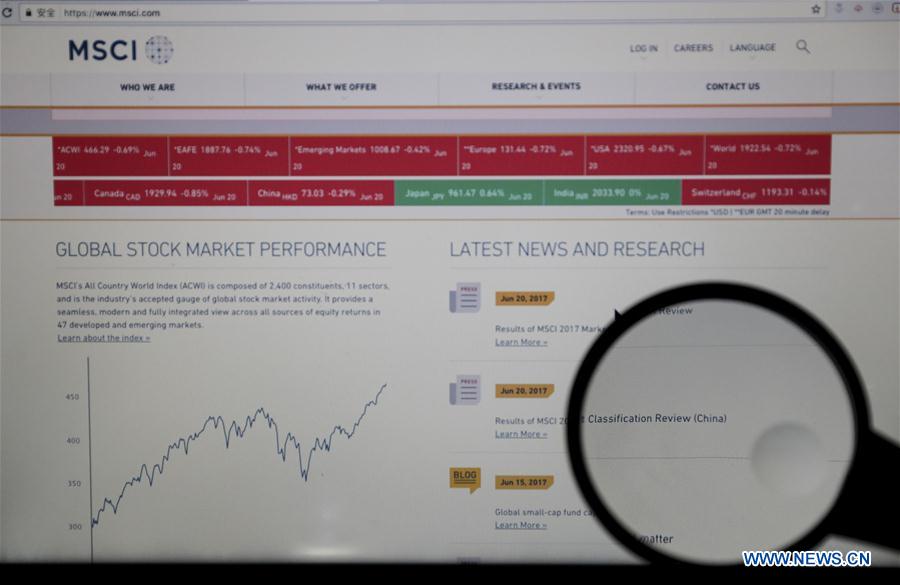
Photo taken on June 20, 2017 shows the website of global equity indexes provider MSCI on a computer in New York, theUnited States. Global equity indexes provider MSCI announced Tuesday that beginning in June 2018, it will include China A-shares in the MSCI Emerging Markets (EM) Index and the MSCI ACWI Index. (Xinhua/Wang Ying)
BEIJING, June 26 (Xinhua) -- For all the uncertainties it faces, China's economy is viewed with confidence as reforms generate investment opportunities in its financial market and currency.
Leading global equity index compiler MSCI last week decided to include 222 Chinese A-shares in one of its most traded indexes, citing positive changes in the accessibility of the A-share market.
Earlier this month, the European Central Bank (ECB) said it shifted 500 million euros worth of its foreign reserves to the yuan during the first half of 2017, adding the Chinese currency to its reserves for the first time.
Economists say this demonstrates that global investors have faith in China's economic outlook and financial market health despite slower growth and structural challenges.
The ECB's investment in yuan reserves shows upbeat sentiment from one of the world's most important central banks, said Dong Ximiao of Chongyang Institute for Financial Studies at Renmin University of China.
Shi Donghui, a capital market researcher at Shanghai Stock Exchange, called the MSCI inclusion "a vote of confidence in China's efforts to push for economic globalization and merge into the global financial market."
A large portion of the confidence arose from reforms by China to open up its financial markets and upgrade the economy in recent years.
To make its stock market more accessible for foreign investors, policy makers have taken an array of measures, including the launch of stock connect programs between the mainland and Hong Kong bourses, better regulation of arbitrary trading suspensions, and looser restrictions on qualified foreign institutional investment.
Authorities have also allowed qualified overseas investors to enter the mainland interbank bond market via a mainland-Hong Kong bond connect program.
These measures diversified yuan-denominated products available for international investors and increased cross-border transactions in the yuan, giving a boost to the currency's rise as an international currency, Dong said.
Besides, the MSCI inclusion and the bond connect program will facilitate long-term capital flows into the Chinese financial market and help support the yuan's value, he believes.
There had been concerns about capital flight since the second half of 2016, when the economy was facing downward pressure and the Chinese yuan was in the middle of a losing streak against the dollar.
But the yuan has gradually recovered from its weakness as the Chinese economy firmed up in the first quarter of the year, with forecast-beating GDP growth, and the greenback became less volatile.
Latest indicators showed China's consumption remained robust in May, with fixed-asset investment holding steady in real terms and export growth beating expectations.
Though the internationalization of the yuan slowed down last year due to exchange rate fluctuations, the overall trend has not been changed, Dong said.
He attributed growing confidence in the yuan to stable momentum of growth in the Chinese economy and stronger financial regulation to defuse risks.
Thanks to supply-side structural reforms to create new sources of growth, the economy is steadily shifting from investment-fueled growth toward more sustainable consumption-driven growth.
Meanwhile, the financial sector has seen its high leverage reduced, with stricter curbs on asset bubbles and non-performing loans.
Earlier this month, both the International Monetary Fund and the Organization for Economic Co-operation and Development raised China's growth forecasts for 2017 to 6.7 percent and 6.6 percent, respectively.
There are downside risks, too. In a recent research note, investment firm China International Capital Corp. cautioned of over-tightening of financial conditions due to tougher regulation and a weaker-than-expected property market.
Hopes are pinned on the advancing of China's reforms to continue to bolster global investors' confidence.
The inclusion into the MSCI index was just a beginning for China's capital market to connect with the outside, said Shenwan Hongyuan Securities analyst Gui Haoming, who anticipated it to force authorities to implement more market-oriented reforms to meet overseas investors' demand.
Speaking of the future of the yuan as an international currency, Guan Tao, a senior fellow at the China Finance 40 Forum, said it is eventually up to China's progress in economic reforms and structural adjustment.















